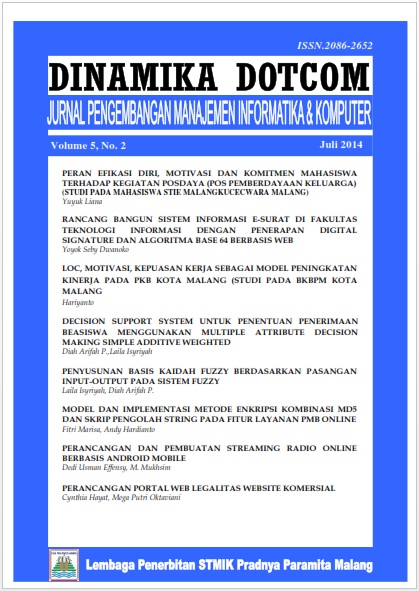DECISION SUPPORT SYSTEM UNTUK PENENTUAN PENERIMAAN BEASISWA MENGGUNAKAN MULTIPLE ATTRIBUTE DECISION MAKING SIMPLE ADDITIVE WEIGTHED
Abstract
Scholarship funding is not sourced from own funds or a parent whogiven to increase the capacity of human resources through education. In every educational institution many scholarships are offered to students who excel and are less capable. To get the scholarship then it must conform to the rules that have been set. Criteria established in this study were age (C1), the number of dependent parent (C2), number of siblings (C3), the number of parents income (C4), the average value of report cards (C5), achievement (C6), the limit power is used (C7), home ownership status (C8).
Selection of scholarship acceptance is done manually resulting in frequent occurrence of errors in determining the recipient beasiswa.Jumlah many participants who submitted scholarship criteria and indicators too much and in order to obtain the appropriate recipients in accordance with existing criteria, it is necessary to build a decision support system that will help determine scholarship recipients are eligible to receive the scholarship.
In this study, the authors used a model of multiple attribute decision making, simple additive weighted method. In this method of assessment is based on criteria and the weight values that have been determined in advance, and then proceed with the ranking process that will select the best alternative. With this ranking process, the assessment would be more precise, more accurate results are obtained
References
. Gafur, Abdul. 2008. Cara Mudah Mendapatkan Beasiswa. Jakarta: Penebar Plus Daihani, Dadan Umar. 2001. Komputerisasi Pengambilan Keputusan. Jakarta: Elex Media Komputindo
. Turban, Efrain dan Aronson, Jay , 2001, Decision Suport System and Intelligent System, Prentice Hall, New Jersey.
. Kahraman, Cengiz. 2008. Fuzzy multi-criteria decision making Theory and applications with Recent Developments. Istanbul: Istanbul Technical University.
. Kusumadewi, Sri., Hartati, S., Harjoko, A., Wardoyo, R. (2006). Fuzzy Multi Attribute Decision Making (FUZZY MADM). Yogyakarta: Graha Ilmu


